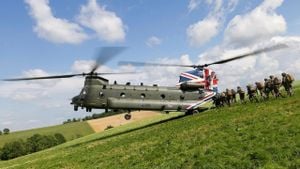Australia is stepping up its game with rugby diplomacy, aiming to forge stronger ties with Papua New Guinea (PNG) and curb China’s growing influence over the region. The Australian government recently announced it would invest AU$600 million (approximately US$382 million) to establish a rugby league team within PNG. This strategic initiative seems as much about sports as it does about geopolitics.
At the heart of this deal is the establishment of PNG’s very own rugby league team, due to join the National Rugby League (NRL) by 2028. During the official announcement on December 12, 2024, Australian Prime Minister Anthony Albanese and PNG Prime Minister James Marape underscored the potential of rugby to unite communities within PNG, a nation well-known for its passionate rugby fanbase.
Yet, for all the enthusiasm around sporting collaboration, there’s another layer to this partnership. The investment includes some rather serious strings attached: PNG is to prioritize Australia as its main security partner and refrain from engaging with China on defense matters. This stipulation reflects Australia’s need to counteract the growing reach of Chinese influence, particularly following Beijing's recent attempts to bolster bonds through similar security agreements with other Pacific nations.
Australia shares long-standing ties with PNG, beyond rugby; it has been the nation's largest aid donor, providing $637 million as part of various support initiatives throughout the year. The relationship, rooted deeply since PNG's independence from Australia back in 1975, faces new challenges as China actively seeks to tighten its grip on the Pacific region.
Untangling the threads of influence, experts argue this rugby deal exemplifies the use of sports as soft power—a growing method for nations to maintain influence. Mihai Sora, Director of the Pacific Islands Program at the Lowy Institute, describes this crossover of diplomacy and sports as pivotal for Australia’s strategic positioning. “It’s unusual to see such significant ties knitted through sports, but this approach connects economic support to community enthusiasm for rugby,” Sora notes.
For PNG, the influx of funding could translate to much more than rugby; by channeling substantial financial resources toward sports infrastructure, Australia may lay the groundwork for lasting socio-economic improvements. The rugby league team could serve as both entertainment and inspiration, fostering national pride and social unity. Marape emphasized, “What you are gifting to us in the license to have a team goes to the heart of uniting our diverse country.”
And the rugby connection resonates well with locals, who have shown unbridled enthusiasm for the sport, often described as the nation’s favorite pastime. This passion indicates potential community support for the team, which could then extend Australia’s influence without the overt pressure of traditional diplomatic measures.
Prime Minister Albaneas described this agreement as more than just sports integration; it embodies the shared values and the aim of both nations to focus on inclusive growth, particularly concerning women and girls who will benefit from rugby initiatives aimed at promoting gender equity. “Partnering on rugby league is a genuine and powerful way of building lasting ties between our peoples,” he declared.
The underlying tension with China cannot be overlooked. Just earlier this year, China had proposed policing agreements with PNG, fueling concern among Australian and U.S. authorities who see such moves as extending China's security footprint within the Pacific Sea. While Marape maintains PNG’s relationship with Australia and the U.S. for security matters remains intact, his government has also actively sought out partnerships with China for economic gain, making the diplomatic balancing act especially complex.
International relations experts suggest the real success of this deal will likely not just be measured by the establishment of the rugby team, but rather by its ability to hold sway over PNG’s future partnerships or prevent them from engaging with China militarily. This blend of soft power through sports and hard-line security measures may serve as Australia’s pathway to keeping its strategic interests secure.
Just days following the rugby deal announcement, Australia solidified its stance on regional security by signing another similar pact with the island nation of Nauru, which emphasizes their commitment to maintaining stability across the Pacific.
While the success of this rugby diplomacy remains to be seen, the groundwork laid could offer not only immediate engagement opportunities for both nations, but also pave the way for broader cooperation on several fronts, including trade, education, and health.



